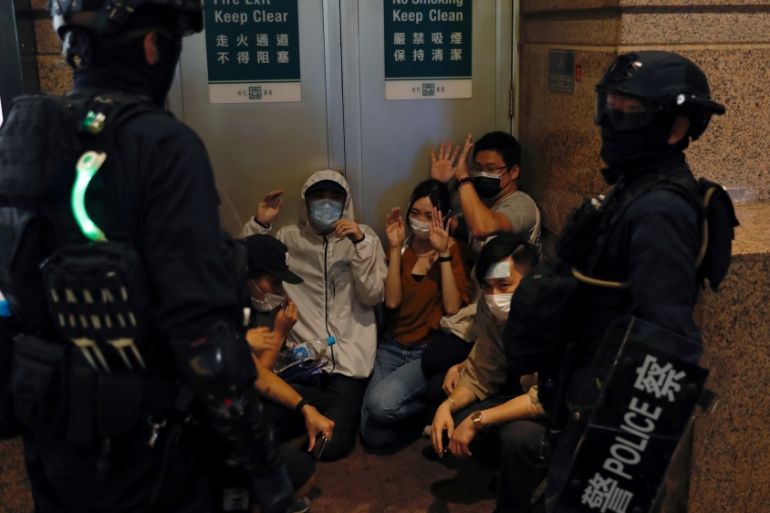US Congress passes bill penalising banks over China’s new HK law
China has responded by saying the US should stop interfering in Hong Kong and warned that it would ‘forcefully resist’.

The United States Senate passed legislation on Thursday to penalise banks doing business with Chinese officials who implement Beijing’s draconian new national security law on Hong Kong, sending it to the White House for President Donald Trump’s signature.
The bill passed the Senate by unanimous consent, a day after the House of Representatives also passed it without opposition, a rare example of overwhelming bipartisan support, reflecting concern in Washington over the erosion of the autonomy that had allowed the former British colony to thrive as China’s freest city and an international financial centre.
Keep reading
list of 4 itemsHong Kong’s new security law comes into force amid human rights concerns
Hong Kong passes tough new national security law
What is Article 23, Hong Kong’s new draconian national security law?
“This is an urgent moment. Our timing could not be more critical,” said Democratic Senator Chris Van Hollen, a lead sponsor of the “Hong Kong Autonomy Act,” in a Senate speech urging support for the legislation.
“Through this bill, the US Senate makes clear which side we are on,” said Republican Senator Pat Toomey, who also introduced the measure.
|
|
The bill would impose sanctions on entities that help violate Hong Kong’s autonomy and financial institutions that do business with them.
China responded to the bill by saying the US should stop interfering in Hong Kong affairs and warned that it would “resolutely and forcefully resist”.
Hong Kong returned to Chinese rule in 1997 under a “one country, two systems” formula that protected its freedoms, including an independent legal system, and wide-ranging autonomy. But China on Tuesday introduced sweeping national security legislation for the territory, condemned by the United States, Britain and other Western countries.
British Foreign Secretary Dominic Raab reprimanded HSBC and other banks on Wednesday for supporting the new law, saying the rights of Hong Kong should not be sacrificed for bankers’ bonuses.
‘Brutal, sweeping crackdown’
Senior British and US politicians criticised HSBC and Standard Chartered last month after the banks backed the new law.
The new Chinese security law, which punishes crimes of secession, subversion, terrorism and collusion with foreign forces with up to life in prison, will see mainland security agencies in Hong Kong for the first time and allows extradition to the mainland for trial.
|
|
House Speaker Nancy Pelosi made an unusual appearance at a committee hearing on the situation in Hong Kong on Wednesday to say the security law marked the death of the “one country, two systems” principle.
“The law is a brutal, sweeping crackdown against the people of Hong Kong, intended to destroy the freedoms they were promised,” she told the House Foreign Affairs Committee hearing.
Chinese Foreign Ministry spokesman Zhao Lijian said in Beijing the US “must stop advancing the bill, let alone sign it or implement” it.
“Otherwise China will resolutely and forcefully resist,” he said.
The White House did not immediately respond to a request for comment on whether Trump would sign the act into law.
Vice President Mike Pence condemned the new Chinese law.
“The national security law that China passed and now is imposing on Hong Kong is a – it’s a betrayal of the international agreement that they signed and ultimately it’s unacceptable to freedom-loving people around the world,” he told CNBC.
The US has already begun eliminating Hong Kong’s special status, halting defence exports and restricting the territory’s access to high-tech products.